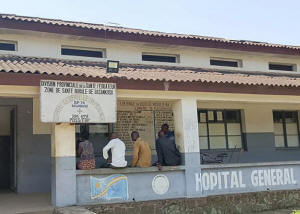WHO says water contamination is suspected in one of the Congo villages
struck by illness
[March 01, 2025]
BASANKUSU, Congo (AP) — Authorities investigating the deaths of
at least 60 people in northwestern Congo suspect the water source in one
of the areas may have been contaminated, the World Health Organization
said Friday. But the agency said it's too early for any definitive
conclusion.
Doctors are investigating more than 1,000 illnesses that emerged since
late January in five villages in Congo's Equateur province, where high
rates of malaria have complicated efforts to diagnose the cases and
where officials have said they've been unable so far to confirm the main
cause.
WHO emergencies chief Dr. Michael Ryan said during an online briefing
Friday that for one of the villages there is “a very strong level of
suspicion of a poisoning event related to the poisoning of a water
source."
Ryan did not clarify whether he was referring to contamination by
accident, negligence or deliberate action. He also did not identify the
village where the poisoning was suspected.
"We will not stop investigating until we are sure that the true cause or
the absolute cause of what is occurring here is fully investigated,”
Ryan said.
Illnesses were first detected in late January in the village of Boloko
after three children ate a bat and died within 48 hours.
Twelve cases and eight deaths in total have been recorded in Boloko,
with no new cases recorded since January, officials say, adding that
nearly half of deaths there occurred within hours of the onset of
symptoms.

[to top of second column]
|

Men sit outside the general hospital in Basankusu, Democratic
Republic of the Congo, where some victims of unidentified illnesses
are being treated, Thursday, Feb. 27, 2025. (AP Photo/Guy Masele
Sanganga)
 The village of Bomate in Basankusu
health zone, around 200 kilometers (125 miles) from Boloko, has been
hit the most: 98% of the cases and 86% of deaths have been recorded
there, health officials say.
WHO said on Thursday that hundreds of the patients have tested
positive for malaria, which is common in the region. In addition to
common malaria symptoms such as fever and body aches, patients have
also shown symptoms like chills, sweating, stiff neck, runny or
bleeding nose, cough, vomiting and diarrhea.
The health crisis has caused fear among residents, some of whom have
said they fled the villages to avoid falling sick.
Experts say access to the sick has been hindered by the remote
locations of the affected villages and that several people died
before medical teams were able to reach them.
All contents © copyright 2025 Associated Press. All rights reserved |